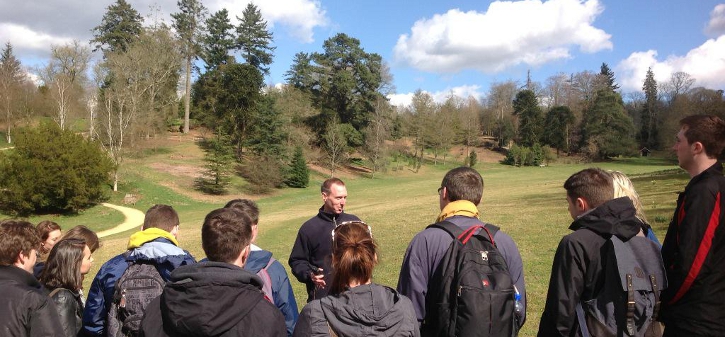In This Section
Applied Plant Biology - London 2015

UCC plant science students get unique access, behind-the-scenes at Kew.
This year marks a new departure for the Applied Plant Biology BSc programme at University College Cork with the introduction of a new residential field course based in London.
The field course (PS3020, Plant Biology Field Course) is a third-year module and involves four full days in London. This year, day one and two involve 'behind-the-scenes' tours of the Royal Botanic Gardens sites at Richmond and Wakehurst. Kew is the centre-piece of plant biology worldwide and the course offers UCC students invaluable access to Kew's facilities and scientists.
Day three involves a tour of Syngenta's major crop protection research facilities at Jealott's Hill - their largest R&D site in the world, employing nearly 800 scientists and support staff. Jealott's Hill is also the site of the biggest glasshouse research complex in Europe.
Day four sees UCC students visiting the facilities of Tozer Seeds - a major plant breeding and seed production company, before concluding the field course with a guided tour of the historic Chlesea Physic Garden in central London.
Founded in 1673 with the purpose of training apothecaries (pharmacists) in the importance of medicinal plants, the Chelsea Physic Garden continues today as an important centre for research and education on the importance of plants to society and in particular to medicine.
You can follow updates from the field course on twitter #ps3020 or on the BEES Facebook page.
#ps3020. First day - a tour of the Herbarium in Kew with our wonderful guides Pat, Sofia and Susana pic.twitter.com/MQN14zIKAK
— Barbara Doyle Prest (@BarbaraDoylePre)
March 30, 2015
#ps3020. UCC APB 3rd yrs head to the vault at Millennium Seed Bank Kew where all the good stuff is stored! pic.twitter.com/yEwbQwuPdF
— Barbara Doyle Prest (@BarbaraDoylePre)
March 31, 2015
Great visit today from @uccBEES Applied Plant Biology students. Ollie showing off our #JealottsHill glasshouse pic.twitter.com/v7WI5NWOVa
— Syngenta UK (@SyngentaUK)
April 1, 2015
School of Biological, Earth and Environmental Sciences
An Scoil Eolaíochtaí Bitheolaíocha, Domhaneolaíocha agus Comhshaoil
Contact us
Distillery Fields, North Mall, University College Cork, Ireland , T23 TK30
